Housing in Allston
Local Schools & Restaurants — Featured Listings
Allston is one of Boston’s more vibrant neighborhoods. Its most thriving business is its nightlife where bars and restaurants comprise the center of the neighborhood providing “super-cool” niches throughout the community… whether you prefer playing late-night, dive-bar darts or sipping early-morning coffee in funky cafes. Hard-partying frat boys share Allston-Brighton with hard-working entrepreneurs, and the neighborhood’s architecture is just as diverse where well-lived in college apartments abut well-tended Victorians. Whether your scene is ragged jeans or refined garb, you’ll find something to love in this conveniently located neighborhood. If you are planning to buy a home in the area, stick to Brighton for a quieter and more stable environment. Unlike Allston’s shops and services, Brighton offers parks and open space, tree-lined streets, and a more family-oriented, “community” feel. Brighton is much more likely to have the wooden, triple-decker houses, and more families residing in them, than small apartment buildings and students.
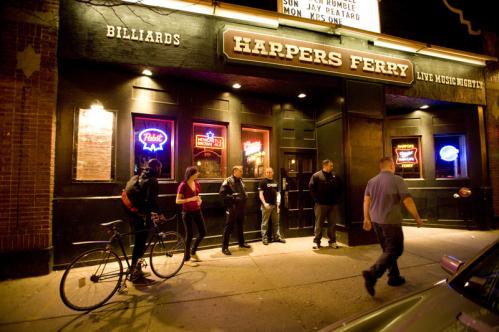
Diversity
Housing is varied in the area, but the section of Allston along Commonwealth Avenue offers a number of small brick apartment buildings. Farther away from Commonwealth, off of Brighton Avenue and closer to Brighton are more wooden triple-decker houses. You should be aware that, In the Allston zip code of 02134, only 13% of the housing is owner-occupied, compared to the national rate of 66%. Most of Allston is rented, predominantly to students. The quality of housing in Allston is mixed, varying from well-maintained to worn down. Landlords and property owners who do not rent to undergraduate students (a fairly common business practice in Boston) tend to have slightly better maintained buildings than those who do. Allston is “funkier” than its neighbor, Brighton. It has a diverse makeup with many middle-class families living in single and dual-family homes. Free parking on the street is tight, but available. A residential parking sticker is required in some areas. Pictured below is a “co-op” building in Allston.
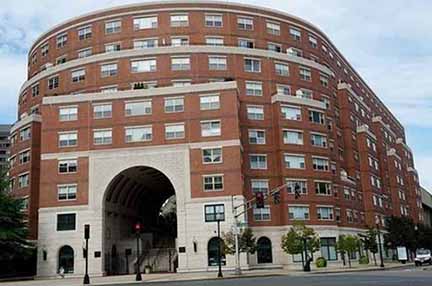
The Sub-Neighborhoods of Allston
The combined area is also made up of a number of smaller sub-neighborhoods. North Allston is located to the north of the Massachusetts Turnpike, and hosts Harvard’s Business School and field. Allston Village, located at the eastern section of Allston, is a popular party spot for students and musicians and probably the most popular section of the neighborhood for BU undergraduates. North Allston is less urban than the Allston Village area, offering a number of single-family homes (one of the few areas in the neighborhood that does). Rowhouses or brownstones are relatively rare in this area. Most of the people living in North Allston are either long-term residents, or Harvard (see photo below) students and staff. Because the turnpike cuts Allston in half, North Allston shares little in common with Allston Village, except for a branch of the Boston Public Library. The #66 bus does connect the two sections of the neighborhood.

Other Info About Allston-Brighton
While 47% of the population of Brighton drive to work, 36% use mass transit, compared with 71% and 2% respectively for the United States as a whole. This is probably due in part to the number of bus, subway, and commuter choices available. The B section of the Green Line is accessible from many parts of the area.
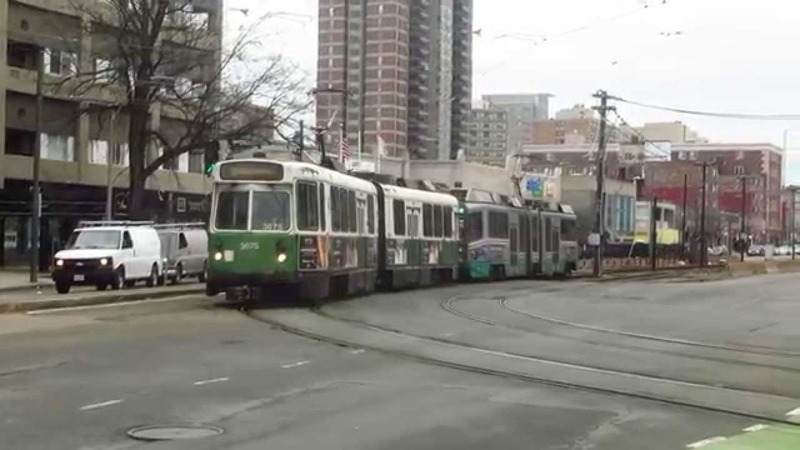
Access the City of Boston’s official website, including the neighborhood of Allston-Brighton. If you have school-age children, Allston lies in the Boston Public School district. Its transportation policies are outlined here. It is always wise to check if there is reported criminal activity in the area in which you plan to live. To keep up with daily goings on, in general, you can check in online with the Allston-Brighton Tab, The Patch, the Boston Guardian, or, of course, the Boston Globe and the Boston Herald.
If you have a specific property in mind that you think you might like to buy, the City of Boston maintains a database for the City Assessor which you can access to see what value the City gives the property and what the annual taxes are. Boston does offer a residential tax break for primary residences for which you should apply upon your purchase.
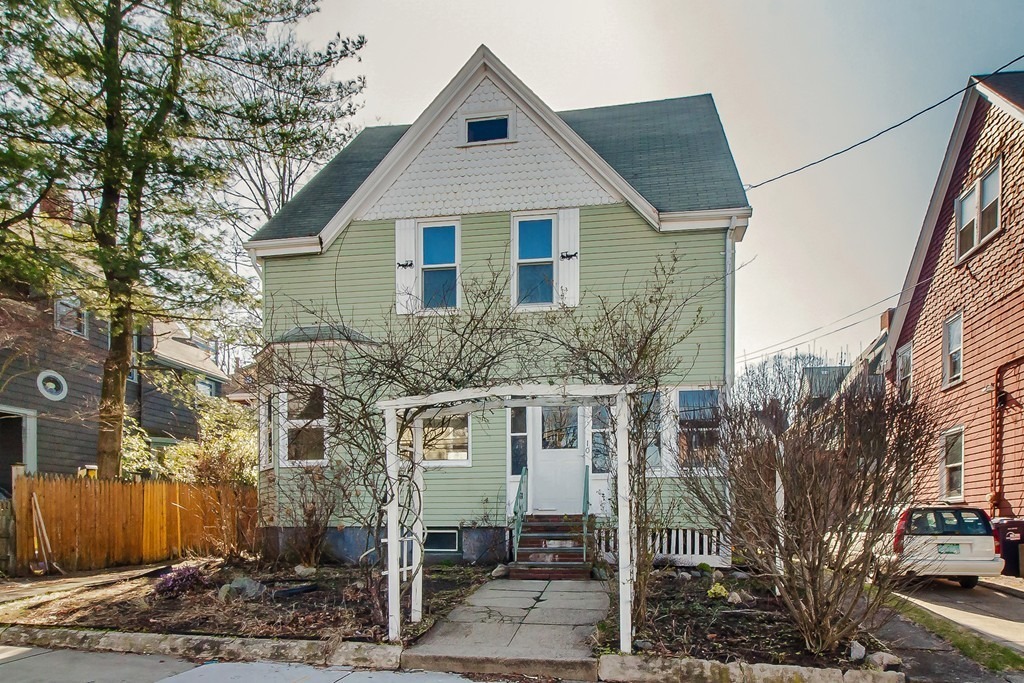
Great Schools provides ratings for most schools in the United States. Below, you can see what schools are near the address you are thinking of buying and then compare it to other neighboring schools.
Area Schools
The following chart is a visual representation of the cyclical nature of real estate activity and compares the ups and downs of Allston to those of all of the city of Boston. The taller the column the better it is for buyers. The shorter the column the better it is for sellers. Hence 2006 was the best time for a buyer to buy in Allston, while 2015-2018 were great years for sellers. The seller’s market has been slowing since then and so buyers should do well in the near future.
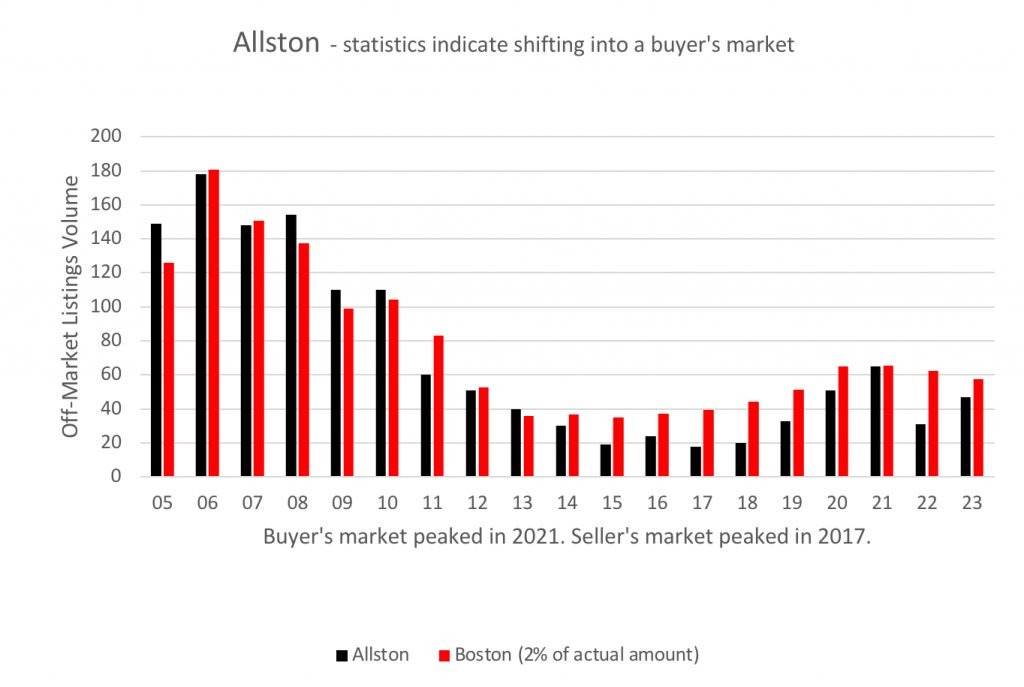
Single family homes in Allston are few and far between and those which have been on the market have seen prices running from $600,000 to $1,100,000 while condominiums have been running from $299,000 to $1,188,000. Rentals are available in Allston ranging from $1350 to $6900/month. Understandingly, rental and sales pricing vary depending upon size, location, and amenities. Real estate sales and pricing are very fluid and can fluctuate in a matter of hours because homes come on and off the market daily… even hourly.
This next chart shows the number of sales occurring in Allston month-to-month, year-to-year since 2018 and provides you a historical overview of the best times to sell – months with the greatest number of sales (spring and fall) – and the best times to buy – months with the fewest number of sales (summer and winter). CAVEAT: there are usually more homes to choose from in the first half of the year.


